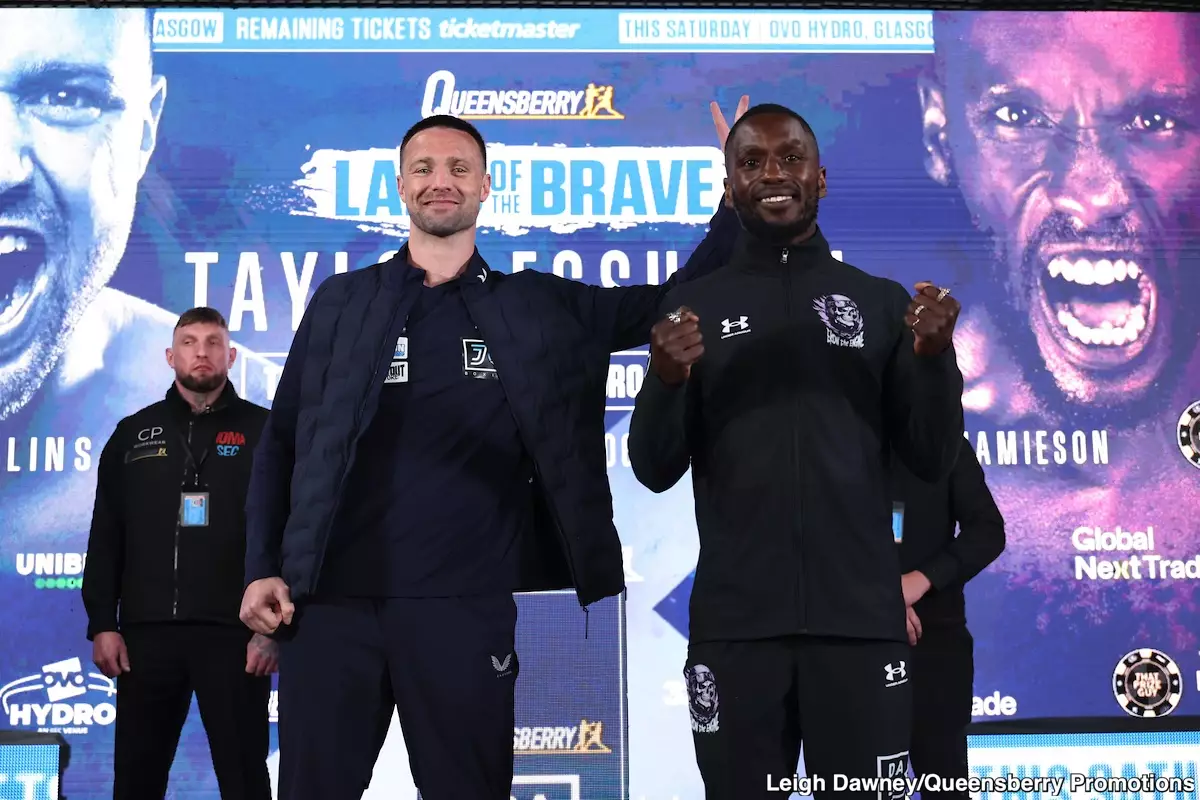This Saturday at The SSE Hydro in Glasgow, Josh Taylor faces a career-defining moment as he takes on Ekow Essuman for the WBO International Welterweight title. Previously crowned the undisputed light welterweight champion, Taylor (19-2, 13 KOs) has recently exhibited a worrying trend in his performances, operating at what many experts suggest is merely 70% of his potential. Following two losses to Jack Catterall and Teofimo Lopez, the former champion finds himself at a critical juncture where a lackluster performance could jeopardize his boxing legacy.
The emphasis on Taylor returning to peak condition cannot be overstated. Boxing’s welterweight division is fiercely competitive, and Taylor must not only shake off the weight of his recent failures but also adapt to the demands of a new weight class as he makes his debut at 147 pounds. He is stepping into the ring against Essuman (21-1, 8 KOs), who is perceived to be a formidable yet untested opponent. While some question Essuman’s pedigree in the ring—having yet to defeat anyone of significant renown—the unpredictability of boxing means that any fighter with proper strategy and fortitude can triumph, especially against an opponent who may not be at their best.
Essuman’s Unknowns: A Double-Edged Sword
The lack of significant victories on Essuman’s record raises questions about his capabilities against an established power puncher like Taylor. It’s easy to dismiss Essuman’s chances due to his previous opponents, but the inherent unpredictability of the sport means that fighters can rise at unexpected moments. A victory for Essuman over Taylor would amplify his career but might also raise eyebrows within the boxing community, considering Taylor’s current form. As Karol Itauma succinctly pointed out, “Ekow is game, and he will try to take you with no respect,” indicating that the challenger poses a real threat despite what his record might suggest.
What makes this matchup even more intriguing is Taylor’s need to not only showcase his power but also his technical prowess. Should Taylor enter the ring at anything less than his full capability—he risks not only losing the fight but also his standing in the sport. A lackluster performance may lead him to be labeled as past his prime, drawing comparisons to fighters who linger in the sport with diminishing returns.
The Risk of Obscurity
Taylor’s decision to abandon the 140-pound division signifies a willingness to embrace change, but it is fraught with peril. With his current record and recent performances underwhelming fans and critics alike, a defeat this weekend could be catastrophic. Playing the role of an underdog is not something Taylor is accustomed to, yet he must recognize that any hint of vulnerability will be pounced upon by both the media and his opponents moving forward. Losing to a rising contender like Essuman could result in a significant dip in his career trajectory, relegating him to the obscurity that often befalls fighters who fail to adapt or evolve.
The narrative surrounding this fight is compelling. Not only does it present Taylor with a chance for redemption, but it also provides Essuman an opportunity to launch himself into the mainstream boxing conversation. As Karol states, “In a performance like that, your whole career trajectory changes,” capturing the essence of what’s at stake for both fighters.
Incremental Step-Ups: The Formula for Longevity
The overarching concern in the boxing community is about fighters taking incremental steps in their careers, which Karol noticed in discussing potential opponents for his brother Moses. If Taylor is to regain his footing at 147 pounds, he’ll need to prioritize facing fighters like Essuman, who may not have impressive credentials but present genuine challenges. The fear of stagnation looms large in the sport, particularly with fighters choosing carefully orchestrated paths to not overextend themselves against formidable opponents.
While some may view Essuman as a stepping stone, his unique position in the ring means that Taylor cannot afford to overlook him. An inability to rise to the occasion will not only set Taylor back but could lead to a reevaluation of his contributions to the sport, risking his status as a respected former champion. This fight serves as more than a title bout; it is a pivotal moment that could define the futures of both boxers.
Thus, the equation is simple: Taylor faces a crossroads of potential redemption. In boxing, where risk is part of the game, absolute commitment and the willingness to adapt will determine if he emerges victorious or fades into relative obscurity.

